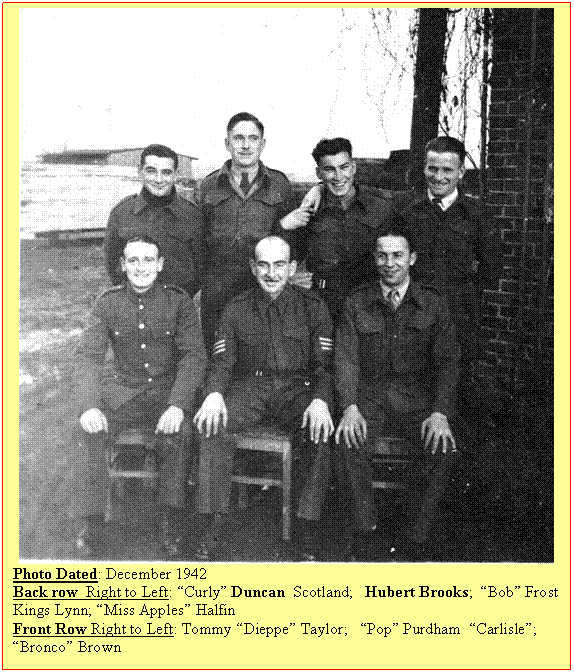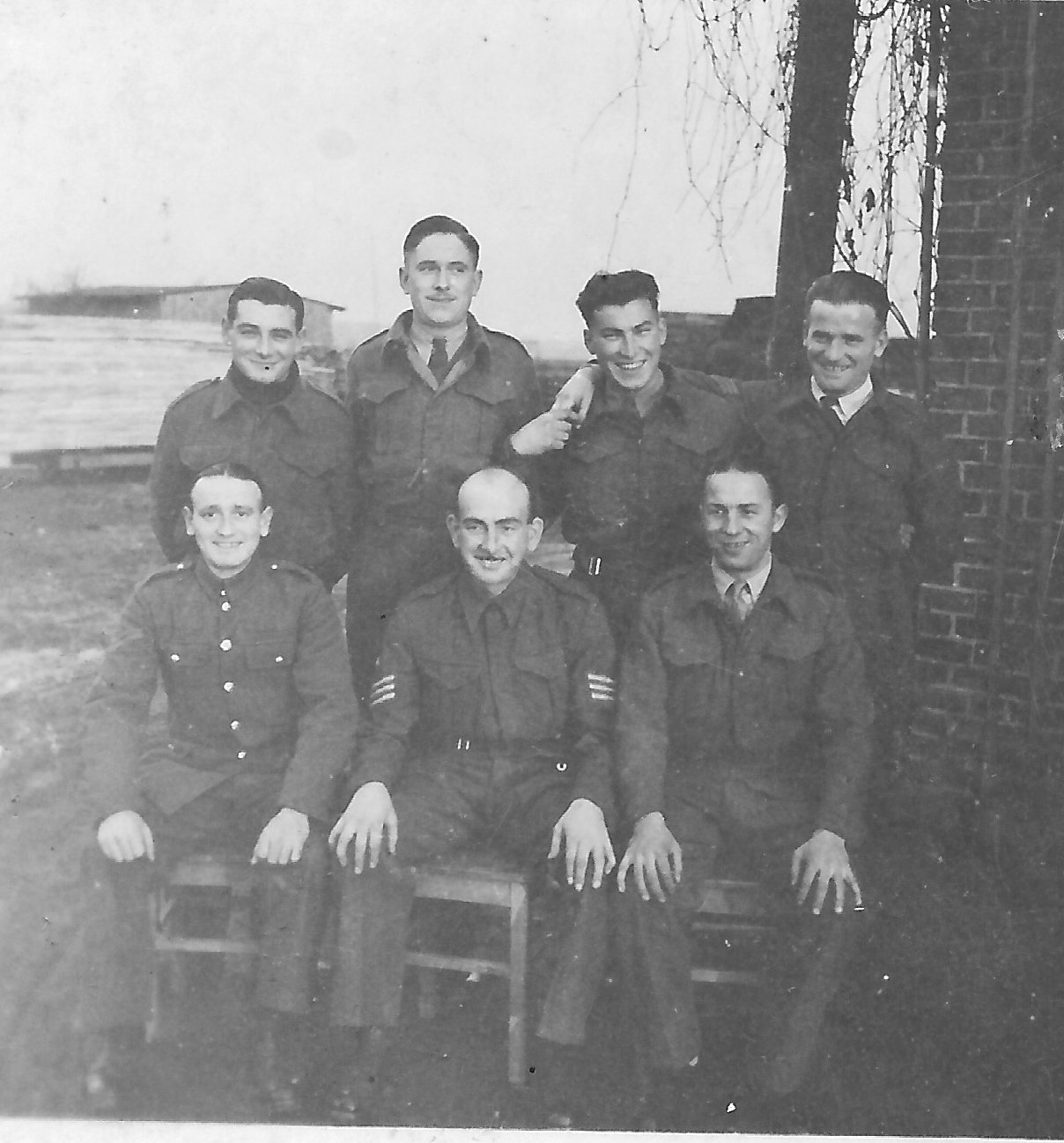
The Life and Times of Hubert Brooks M.C. C.D.
A Canadian Hero

 |
|
 |
Shortly after being released from prison I got on another working party. This time on 10th
November 1942 I was sent to TOST to work in a saw mill.
(Editor's Note: This work party is thought to be associated with work camp E478 in Tost associated with Stalag VIII /344 per web page
Germany Work Camps and web page
Lamsdorf Work Camps .)
I was accompanied by a red headed Scotsman by the name of Sgt. John Duncan 51st of the Gordon Highland Division (2873963). Sgt. John Duncan was the man I teamed up with for the third bid for freedom. He was a seasoned professional soldier – enlisting in December 1928 – and who was captured several hours after his regiment surrendered in St Valery en Caux (Dunkirk) in June 1940. Prior to our meeting, he had three previous escapes including 15 months on the lam in France. He would not have been in Lamsdorf at all if it hadn't been for a jealous woman who betrayed him to the Nazis when he started taking an interest in another girl.
A rare photo of John Duncan and I and some of our prisoner barrack crew taken in Stalag VIII B is shown below. (Note photo sequence here as RIGHT to LEFT.)

|

|

|
Poland, with its hilly terrain covered with forests ideally suited for asylum and local assistance, was our destination again and so, in November 1942, we got ourselves posted to a small working party of 20 men in a sawmill at Toszek (German: Tost) Silesia.
We'd been there only a few days when the Jerry non–com approached my Scots friend and I.
"I know you two want to escape, " he said,
"I'm just warning you, if I catch you trying to escape I'll have to shoot you."
We weren't bothered by his threats, but what did worry us was the knowledge that there was an informer among the POWs. How else would the German "Feldwebel" have been so sure we planned a break? It was imperative that we find out who the informer was – and deal with him. Only then could we safely make our bid for freedom.
We narrowed it down to five men, each of whom had the opportunity to contact the Germans privately. One was our camp cook, who was playing around with a German stenographer in the mill office; another was the interpreter and a third was a private who bribed his way out of camp almost every night to comfort one of the village fraus whose husband was away at the Russian front. During December, the lonely frau had a visit from the Gestapo who charged her with un–German behavior. The private didn't leave camp at night much after that but we did discover that our interpreter was informing on all of us.
The interpreter had an accident a few nights later and had to be sent back to Lamsdorf. Now we could plan our escape without fear, but the first snow had already fallen and it was impossible to think of making our break until spring.
That bleak January of 1943, 16 of our fellow prisoners, almost the entire work party at the sawmill, went on strike and refused to work. They were sent back to the main camp at Lamsdorf and were replaced by 14 Canadians captured at Dieppe. The four of us who remained and had not participated in the strike were given the best jobs.
I became the helper on the truck which delivered lumber pit props each day to mines in the area. Instead of coming back empty we'd load up with coal which we delivered, to households in Tost. The people would often tip me one or two marks for unloading their coal and when we were done, Karl, the German truck driver, would often suggest a quick beer at the nearest tavern. Karl was a friendly soul and as long as I didn't get him into trouble he didn't bother much what I did or who I spoke to. I was able to make contact with a few Poles by putting dirt in the carburetor and each time the engine stalled, which was quite frequently, I told the guard that I would get help from Polish civilians to start the lorry again.
By the end of the winter, as a result of my numerous breakdowns with the lorry, I managed to get and conceal two large maps of Europe and four–quarter inch maps of the Tost district and the entire area as far as Cracow. One Pole I'd met unloading lumber at the pitheads had given me an address at which to contact the underground in the city of Częstochowa. We also accumulated a good supply of Red Cross biscuits, chocolate, etc, a hacksaw blade, and some spare clothes which we stole from the camp store. We also acquired a small compass from a Bavarian woman.
As spring approached Karl became apprehensive.
"What's the matter?" I asked him one day.
"Black Peter," he said (for this was the name he called me by and certainly I was always black from the coal dust),
"Black Peter, if you escape, please don't do it from my truck!"
"Escape?" I replied, "why should I want to escape?"
There were a good many POW's who felt there was no good reason. Escapers weren't particularly popular. They too often spoiled a good thing. The owner of the sawmill at Tost for example, used to fetch us out a barrel of beer every Saturday evening and there were other small treats and priveleges given us so long as we worked hard in the mill and didn't make trouble for anyone.
The moment there was an escape, the guards got merry hell from their superiors and they in turn passed it on to the POW's, discipline stiffened and the barrels of beer went to the guard house instead of the compound.
About this time I was warned again not to escape and we became suspicious of a British POW whom we believed was acting as an informant, but we were never able to catch him.
Undeterred, John and I completed our plans and chose May 10th, 1943, as the night for the break. I had to succeed for this I knew was my last chance. I should never have another opportunity to escape if I failed now. After three bids, the Germans classed POW's as incorrigibles which qualified them for immediate transfer to special punishment camps.
There was no thunderstorm raging this time to cover our departure. Instead, one of our fellow prisoners sat on the steps of the hut obligingly plucking his mandolin and a second man stood by him softly singing. We plunged our hacksaw blade into soap and attacked the window bars. Shortly before midnight, with our gear made up into two bundles, we climbed out, crossed the lumberyard and vanished into the night. As usual we travelled by night and slept in the woods by day.
One day we were woken abruptly by the rumble of cartwheels and peered up cautiously from the underbrush where we lay to see a farm cart pull to a halt 200 yards away. The farmer climbed down and began walking directly towards us.
| PREVIOUS PAGE | GO TO TOP OF PAGE FOR INTER- and INTRA- CHAPTER NAVIGATION MENUS |
NEXT PAGE |
The Life and Times of Hubert Brooks M.C. C.D.